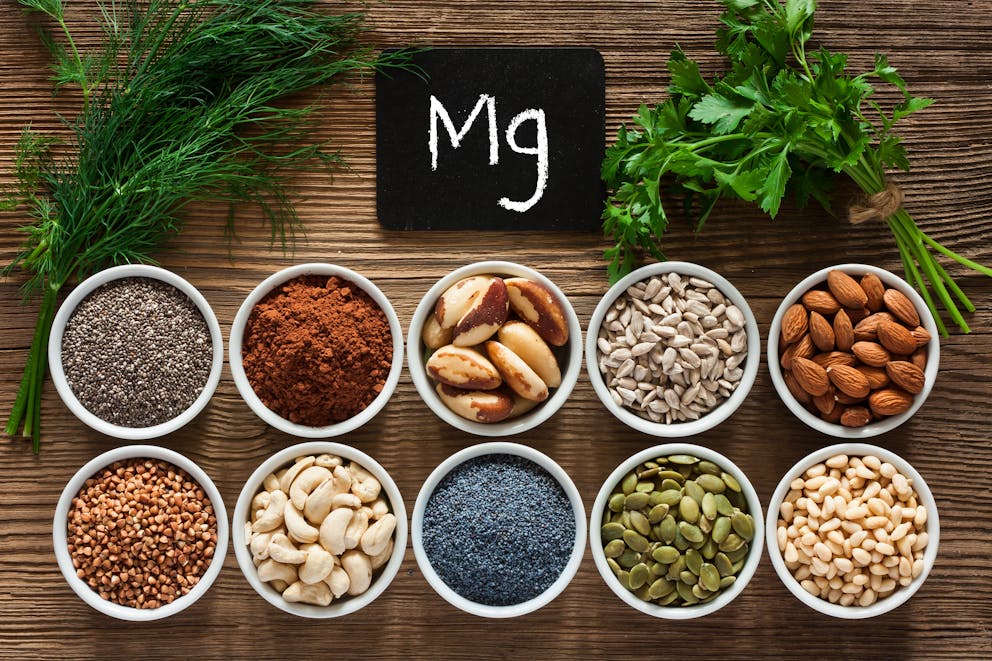9 Unexpected Benefits of Magnesium (MUST WATCH)
Have you ever stopped to think about why leafy green vegetables are considered so healthy? It's not just because of the vitamins but also because they're chock-full of essential minerals like magnesium.
Magnesium is like the silent worker in our bodies, involved in hundreds of processes from energy production to muscle function.
However, many people are walking around with a magnesium deficiency and don't even realize it. This is because magnesium deficiency symptoms can be subtle at first.
Unveiling the Mystery of Magnesium Deficiency Symptoms
You might be surprised to know that magnesium plays a crucial role in over 300 biochemical reactions in your body. It's involved in everything from muscle and nerve function to blood sugar regulation and even DNA synthesis.
If you're low in this crucial mineral, it can manifest in a surprisingly diverse range of symptoms. Let's take a closer look.
Muscle Tightness and Cramps
This is often one of the first noticeable magnesium deficiency symptoms people experience. Ever wake up with a charley horse in your calf or feel a knot in your shoulder that just won't quit?
While many factors contribute to muscle spasms, inadequate magnesium can be a major culprit. Magnesium helps relax your muscles by counteracting calcium, which is necessary for muscle contraction.
Persistent Fatigue and Low Energy
Feeling constantly drained even when you've had enough sleep? Feeling like you're dragging yourself through the day? Low magnesium levels could be to blame. Magnesium is vital in converting food into usable energy (ATP).
Even if you're eating well, a magnesium deficiency might be holding you back from feeling your best.

Insomnia and Difficulty Staying Asleep
If you have trouble falling asleep or staying asleep, magnesium could be the missing link. Magnesium promotes relaxation and calms nerve activity, preparing your body and mind for restful sleep.
It even plays a role in regulating melatonin, your body's natural sleep-wake cycle hormone.
Anxiety and Increased Stress
You know that magnesium helps with muscle tension, but did you know that tension can also manifest in your mental state? Studies have linked magnesium deficiency to an increased risk of anxiety and heightened stress.
This essential mineral seems to have a calming effect on the nervous system, promoting a sense of well-being.
Headaches, Even Migraines
Do you frequently find yourself reaching for pain relievers for headaches? Many people swear by magnesium as a natural approach to managing these often-debilitating events.
Some studies show magnesium may help reduce the frequency and severity of migraines and tension headaches.
Other Potential Magnesium Deficiency Symptoms:
While the above are some of the most common magnesium symptoms, everyone is different. Magnesium deficiency can present in other ways. Here are a few other potential signs to be aware of:
Constipation.
Loss of appetite.
Nausea and vomiting.
Numbness or tingling sensations.
High blood pressure.
Abnormal heart rhythms.
Understanding Magnesium: Why It's Crucial for Your Health
Magnesium is involved in a wide range of bodily functions, including:
Muscle and nerve function: Magnesium helps regulate muscle contractions and nerve impulses. It plays a vital role in maintaining normal heart rhythms.
Energy production: Magnesium is a cofactor for over 300 enzymes involved in energy metabolism. This includes the breakdown of carbohydrates, fats, and proteins for energy.
Blood sugar control: Magnesium helps improve insulin sensitivity, allowing your cells to use glucose more effectively and regulate blood sugar levels.
Bone health: Magnesium is essential for calcium absorption and bone formation, contributing to strong and healthy bones.
Mood regulation: Magnesium influences neurotransmitters involved in mood regulation, such as serotonin.
Sleep quality: Magnesium promotes relaxation and calms the nervous system, which can improve sleep quality.
Blood pressure regulation: Magnesium helps relax blood vessels, which can contribute to healthy blood pressure levels.
How to Determine if You Have a Magnesium Deficiency
If you suspect you might have a magnesium deficiency, it's important to consult with a qualified healthcare provider. They can assess your individual situation, consider your medical history, and determine the best course of action.
Diagnosing a magnesium deficiency can be tricky as there's no single definitive test. Your healthcare provider may use a combination of methods, including:
Physical exam and medical history: Your healthcare provider will ask about your symptoms, diet, lifestyle, and any medications you're taking.
Blood test: A magnesium blood test measures the levels of magnesium in your blood. It's important to note that this test might not always accurately reflect your body's total magnesium status, as most magnesium is stored inside cells and bones.
Urine test: A urine test can measure how much magnesium your body excretes.
Other tests: In some cases, your healthcare provider might recommend additional tests to rule out other conditions or assess related nutrient levels, such as calcium blood tests or potassium levels.
Addressing Magnesium Deficiency
If you are diagnosed with a magnesium deficiency, your healthcare provider will work with you to develop an appropriate treatment plan, which may include:
Dietary Changes
One of the first steps in addressing a magnesium deficiency is often through dietary changes. Incorporating more magnesium-rich foods into your diet can make a big difference.
Here are some foods high in magnesium:
Leafy green vegetables: Spinach, kale, and Swiss chard.
Nuts and seeds: Almonds, cashews, pumpkin seeds, and chia seeds.
Legumes: Black beans, lentils, and chickpeas.
Whole grains: Brown rice, quinoa, and oats.
Avocado
Dark chocolate (at least 70% cocoa)

Magnesium Supplements
In some cases, dietary changes alone might not be sufficient to correct a magnesium deficiency. Your healthcare provider may recommend magnesium supplements to help you reach adequate levels.
Various types of magnesium supplements are available, including magnesium citrate, glycinate, oxide, and chloride. It's important to consult with your healthcare provider to determine the appropriate type and dosage for your individual needs.
Addressing Underlying Health Conditions
If an underlying health condition, such as celiac disease, Crohn's disease, or kidney problems, is contributing to your magnesium deficiency, managing these conditions effectively is crucial.
Addressing these root causes can improve magnesium absorption and reduce deficiency risk.
Magnesium Toxicity: What You Need to Know
While magnesium is essential for health, it's possible to have too much of a good thing. Magnesium toxicity, also known as hypermagnesemia, is a condition that occurs when magnesium levels in the blood become too high.
This is usually caused by excessive intake of magnesium supplements, particularly in people with kidney problems.
Symptoms of Magnesium Toxicity
Symptoms of magnesium toxicity can vary depending on the severity of the condition. Some common symptoms include:
Nausea and vomiting.
Diarrhea
Muscle weakness.
Low blood pressure.
Slow heart rate.
Difficulty breathing.
Confusion.
In severe cases, magnesium toxicity can lead to coma, cardiac arrest, or even death. It's important to seek immediate medical attention if you experience any of these symptoms after taking magnesium supplements or if you suspect you might have magnesium toxicity.
The Importance of Consulting a Healthcare Professional
While information about magnesium and its role in health is readily available, it's crucial to remember that this information is not intended as a substitute for professional medical advice, diagnosis, or treatment.
The human body is complex, and what works for one person might not be suitable for another.
Before making any significant changes to your diet, taking supplements, or starting any new health regimen, it's essential to consult with a qualified healthcare provider.
They can help you determine the best course of action based on your individual health status, needs, and goals.
Self-treating can be risky and potentially harmful, so it's always best to err on the side of caution and seek personalized guidance from a medical professional.
Recognizing Magnesium Deficiency on a Ketogenic Diet
Magnesium deficiency can manifest in various ways, including muscle cramps, fatigue, irritability, and even abnormal heart rhythms.
For individuals following a ketogenic diet, this deficiency is particularly common, as many magnesium-rich foods like grains and fruits are limited.
Incorporating keto magnesium supplements can help address these symptoms, providing the body with the magnesium it needs to function optimally.
In addition to supporting muscle and nerve function, magnesium is essential for maintaining electrolyte balance, especially on a ketogenic diet.
If you're experiencing any of these deficiency symptoms, adding keto magnesium to your regimen may help restore balance and improve overall well-being.
Conclusion
As you can see, magnesium is involved in so many important processes in the body that even a mild deficiency can significantly impact your health and well-being.
If you think you're experiencing magnesium deficiency symptoms, consult with your healthcare provider for personalized guidance. By addressing any potential deficiencies and ensuring adequate magnesium intake, you can support your overall health and vitality.
Previous blog
Female Bladder Leakage (THE BEST NATURAL SOLUTION)Tags

Popular
08/21/2024
55K views
02/23/2025
46.3K views
11/18/2024
277.5K views
03/18/2024
11/21/2022




